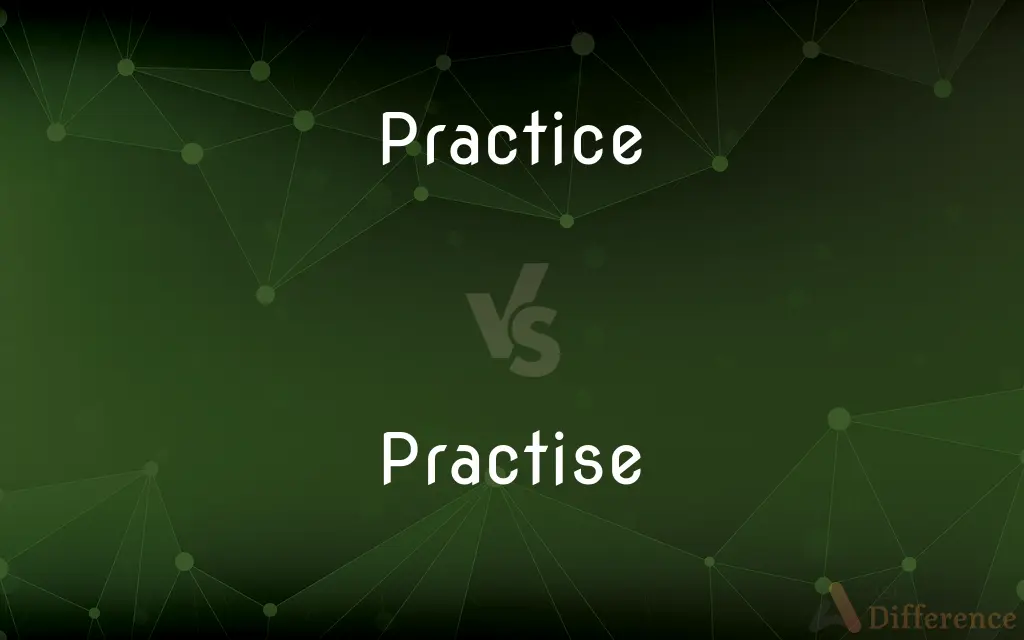Practice vs. Practise — What's the Difference?
By Tayyaba Rehman — Updated on October 16, 2023
In American English, "Practice" is a noun (a medical practice), while "Practise" is the British verb form (to practise medicine).

Difference Between Practice and Practise
Table of Contents
ADVERTISEMENT
Key Differences
In American English, the word "Practice" predominantly functions as a noun. It describes the act or process of performing an activity or skill regularly to improve or maintain one's proficiency, such as in the phrase "I have a piano practice session tomorrow." On the other hand, "Practise" is not standard in American English but is commonly used in British English as the verb form of the word.
"Practice" can denote a professional business, as in "She has her own dental practice." "Practise", in British contexts, might be used to convey the action of performing a particular activity or exercise, as in "I practise the piano every day."
While "Practice" can be understood in terms of a habit or customary action, such as "It's a common practice to shake hands when meeting someone," "Practise" points towards the action or process of performing that habit in British English, like "He practises his handshake to make a good impression."
"Practice" as a noun can be used in various fields, from music to medicine, to law. For instance, "legal practice" refers to the business or place where a lawyer conducts their business. In contrast, "Practise" as a verb in British English might denote the action of a lawyer preparing for a case: "She needs to practise her arguments before the trial."
Lastly, when talking about principles or theories, "Practice" can refer to the actual application or use of an idea, belief, or method, as opposed to the theories related to it. For example, "It's easy in theory, but in practice, it's much more difficult." In the British context, "Practise" could refer to the act of applying those principles: "She needs to practise what she preaches."
ADVERTISEMENT
Comparison Chart
Part of Speech
Noun
Verb (British English)
Example in a Sentence
"She opened her own medical practice."
"He practises yoga every morning."
Common Use
Regular activity or habit
Action of performing an activity (British)
In American English
Standard usage as noun
Less common, practice used for both noun and verb
In British English
Used as a noun
Standard usage as verb
Compare with Definitions
Practice
Regular performance to improve skill.
She has a daily practice of meditation.
Practise
To perform an activity or exercise to improve skill.
She practises the violin every afternoon.
Practice
Customary way of operation or behavior.
It's a common practice to greet with a handshake.
Practise
To train or drill oneself in preparation.
You should practise more before the recital.
Practice
The actual application or use of an idea, belief, or method, as opposed to theories relating to it
The principles and practice of teaching
The recommendations proved too expensive to put into practice
Practise
To be professionally engaged in.
She practises medicine in a renowned hospital.
Practice
The customary, habitual, or expected procedure or way of doing of something
Modern child-rearing practices
Product placement is common practice in American movies
Practise
Engage in a profession.
He decided to practise law in London.
Practice
Repeated exercise in or performance of an activity or skill so as to acquire or maintain proficiency in it
It must have taken a lot of practice to become so fluent
Practise
To carry out or apply habitually.
She doesn't just preach kindness; she practises it.
Practice
US spelling of practise
Practice
To do or perform habitually or customarily; make a habit of
Practices courtesy in social situations.
Practice
To do or perform (something) repeatedly in order to acquire or polish a skill
Practice a dance step.
Practice
To give lessons or repeated instructions to; drill
Practiced the students in handwriting.
Practice
To work at, especially as a profession
Practice law.
Practice
To carry out in action; observe
Practices a religion piously.
Practice
(Obsolete) To plot (something evil).
Practice
To do something repeatedly in order to acquire or polish a skill
With any musical instrument, you need to practice to get better.
Practice
To work at a profession
How long has that lawyer been practicing?.
Practice
To do or perform something habitually or repeatedly
Why not practice in the same manner that you preach?.
Practice
(Archaic) To intrigue or plot.
Practice
A habitual or customary action or way of doing something
Makes a practice of being punctual.
Practice
Repeated performance of an activity in order to learn or perfect a skill
Practice will make you a good musician.
Practice
A session of preparation or performance undertaken to acquire or polish a skill
Goes to piano practice weekly.
Scheduled a soccer practice for Saturday.
Practice
(Archaic) The skill so learned or perfected.
Practice
The condition of being skilled through repeated exercise
Out of practice.
Practice
The act or process of doing something; performance or action
A theory that is difficult to put into practice.
Practice
Exercise of an occupation or profession
The practice of law.
Practice
The business of a professional person
An obstetrician with her own practice.
Practice
A habitual or customary action or act
That company engages in questionable business practices. Facial tattooing is a standard practice among certain peoples.
Practice
(Law) The procedure for trial of cases in a court of law, usually specified by rules.
Practice
The act of tricking or scheming, especially with malicious intent.
Practice
A trick, scheme, or intrigue.
Practice
Repetition of an activity to improve a skill.
He will need lots of practice with the lines before he performs them.
Practice
An organized event for the purpose of performing such repetition.
Being on a team is hard: you're always having to go to practice while everyone else is taking it easy.
I have choir practice every Sunday after church.
Practice
The ongoing pursuit of a craft or profession, particularly in medicine or the fine arts.
Practice
(countable) A place where a professional service is provided, such as a general practice.
She ran a thriving medical practice.
Practice
The observance of religious duties that a church requires of its members.
Practice
A customary action, habit, or behaviour; a manner or routine.
It is the usual practice of employees there to wear neckties only when meeting with customers.
It is good practice to check each door and window before leaving.
Practice
Actual operation or experiment, in contrast to theory.
That may work in theory, but will it work in practice?
Practice
(legal) The form, manner, and order of conducting and carrying on suits and prosecutions through their various stages, according to the principles of law and the rules laid down by the courts.
This firm of solicitors is involved in family law practice.
Practice
Skilful or artful management; dexterity in contrivance or the use of means; stratagem; artifice.
Practice
(math) A easy and concise method of applying the rules of arithmetic to questions which occur in trade and business.
Practice
(US) practise
Practice
Frequently repeated or customary action; habitual performance; a succession of acts of a similar kind; usage; habit; custom; as, the practice of rising early; the practice of making regular entries of accounts; the practice of daily exercise.
A heart . . . exercised with covetous practices.
Practice
Customary or constant use; state of being used.
Obsolete words may be revived when they are more sounding or more significant than those in practice.
Practice
Skill or dexterity acquired by use; expertness.
Practice
Actual performance; application of knowledge; - opposed to theory.
There are two functions of the soul, - contemplation and practice.
There is a distinction, but no opposition, between theory and practice; each, to a certain extent, supposes the other; theory is dependent on practice; practice must have preceded theory.
Practice
Systematic exercise for instruction or discipline; as, the troops are called out for practice; she neglected practice in music.
Practice
Application of science to the wants of men; the exercise of any profession; professional business; as, the practice of medicine or law; a large or lucrative practice.
Practice is exercise of an art, or the application of a science in life, which application is itself an art.
Practice
Skillful or artful management; dexterity in contrivance or the use of means; art; stratagem; artifice; plot; - usually in a bad sense.
He sought to have that by practice which he could not by prayer.
Practice
A easy and concise method of applying the rules of arithmetic to questions which occur in trade and business.
Practice
The form, manner, and order of conducting and carrying on suits and prosecutions through their various stages, according to the principles of law and the rules laid down by the courts.
Practice
To do or perform frequently, customarily, or habitually; to make a practice of; as, to practice gaming.
Practice
To exercise, or follow, as a profession, trade, art, etc., as, to practice law or medicine.
Practice
To exercise one's self in, for instruction or improvement, or to acquire discipline or dexterity; as, to practice gunnery; to practice music.
Practice
To put into practice; to carry out; to act upon; to commit; to execute; to do.
As this advice ye practice or neglect.
Practice
To make use of; to employ.
In malice to this good knight's wife, I practiced Ubaldo and Ricardo to corrupt her.
Practice
To teach or accustom by practice; to train.
In church they are taught to love God; after church they are practiced to love their neighbor.
Practice
To perform certain acts frequently or customarily, either for instruction, profit, or amusement; as, to practice with the broadsword or with the rifle; to practice on the piano.
Practice
To learn by practice; to form a habit.
They shall practice how to live secure.
Practice first over yourself to reign.
Practice
To try artifices or stratagems.
He will practice against thee by poison.
Practice
To apply theoretical science or knowledge, esp. by way of experiment; to exercise or pursue an employment or profession, esp. that of medicine or of law.
[I am] little inclined to practice on others, and as little that others should practice on me.
Practice
A customary way of operation or behavior;
It is their practice to give annual raises
They changed their dietary pattern
Practice
Systematic training by multiple repetitions;
Practice makes perfect
Practice
Translating an idea into action;
A hard theory to put into practice
Differences between theory and praxis of communism
Practice
The exercise of a profession;
The practice of the law
I took over his practice when he retired
Practice
Knowledge of how something is usually done;
It is not the local practice to wear shorts to dinner
Practice
Learn by repetition;
We drilled French verbs every day
Pianists practice scales
Practice
Avail oneself to;
Apply a principle
Practice a religion
Use care when going down the stairs
Use your common sense
Practice non-violent resistance
Practice
Carry out or practice; as of jobs and professions;
Practice law
Practice
Engage in a rehearsal (of)
Practice
The business or premises of a doctor or lawyer.
He just started his own law practice.
Practice
Actual application of a theory.
In practice, things are harder than they seem.
Practice
Repeated exercise to acquire skill.
With enough practice, you can master the piano.
Common Curiosities
Can I use "Practice" as a verb in British English?
No, in British English, the verb form is "Practise."
Which one refers to a doctor's or lawyer's business?
That would be "Practice."
If someone is performing an activity regularly in the UK, which word should they use?
They should use "Practise."
Is "Practice" related only to medical and legal professions?
No, it's used broadly, but can refer to those professions.
Are there other words similar to "Practice" and "Practise" in English?
Yes, like "advice" (noun) and "advise" (verb).
What's the difference between Practice and Practise?
In American English, "Practice" is the noun, while "Practise" is the British verb form.
Which word denotes the actual application of a theory?
That's "Practice."
Is "Practise" used in American English?
Less commonly. Americans usually use "Practice" for both the noun and verb.
Can "Practice" mean a repeated action or activity?
Yes, like "I have piano practice."
Which one is more universally understood?
"Practice" is commonly understood in both American and British English.
Is "Practise" used in any other contexts?
In British English, it's generally the verb form of "Practice."
If someone is referring to a habit or custom, which word do they use?
Use "Practice."
How can I remember the difference between the two?
Think of "advice" (noun) and "advise" (verb) - "Practice" and "Practise" work similarly.
If I'm telling someone to perform an activity in the UK, which word do I use?
Use "Practise," as in "You should practise more."
Are these distinctions important in everyday language use?
It's more important in written English, especially if writing for British or American audiences specifically.
Share Your Discovery

Previous Comparison
Assimilation vs. Adaptation
Next Comparison
Courgette vs. MarrowAuthor Spotlight
Written by
Tayyaba RehmanTayyaba Rehman is a distinguished writer, currently serving as a primary contributor to askdifference.com. As a researcher in semantics and etymology, Tayyaba's passion for the complexity of languages and their distinctions has found a perfect home on the platform. Tayyaba delves into the intricacies of language, distinguishing between commonly confused words and phrases, thereby providing clarity for readers worldwide.














































